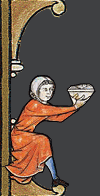
|
Food, Cooking & Eating
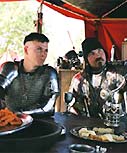 Always remember that what you eat and how you prepare it is entirely
up to you. Having said that...
Always remember that what you eat and how you prepare it is entirely
up to you. Having said that...
Food
Some people are simply not much interested in period food, while
others find it a fun way to enhance the aspects of their event experience.
The "basic rule" is that foods that were not in general use in Western
Europe before 1600 are discouraged. These include tomatoes, potatoes,
capsicum peppers (chili pepper family), pecans and chocolate. Coffee
and tea, as modernly understood, were basically unknown or extremely
rare (though coffee and chocolate are frequent "broken rules".)
Cooking
Cooking at events depends on interest level and type of event...
First comes simply feeding yourself at camping or one-day events at the no cooking, bread / sausage / cheese / fruit, hide-the-coke-can level (transfer your carbonated beverages or neon Kool-Aid to a period container for walking around, eh?).
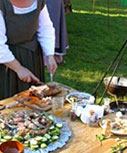 Slightly
advanced from this is cooking semi-modern food with modern utensils
(Coleman ranges, coolers for refrigeration). These modern kitchens
are perfectly acceptable hidden away and out of sight. However,
it is possible to cook completely period dishes over the campfire,
with practice, and having done your research at home first (!).
It takes time, but not necessarily specialized equipment or ingredients. Slightly
advanced from this is cooking semi-modern food with modern utensils
(Coleman ranges, coolers for refrigeration). These modern kitchens
are perfectly acceptable hidden away and out of sight. However,
it is possible to cook completely period dishes over the campfire,
with practice, and having done your research at home first (!).
It takes time, but not necessarily specialized equipment or ingredients.
Non-camping events often include some kind of food. A "day-board" is provided in some areas by the event, usually for the mid-day repast. (If there is nothing like this mentioned in the event copy, you're assumed to be feeding yourself during the day.)
Feasts
"Feast" is usually the evening meal. Feasts can be planned at various
"authenticity" levels, like camp food. The epitome of modern SCA
feast cooking is a collection of heavily researched medieval dishes,
prepared by a large volunteer cooking staff, served in numerous
courses, to hundreds of diners.








|
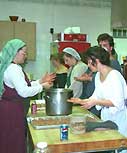
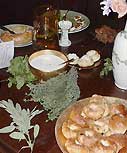
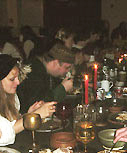
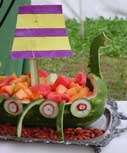
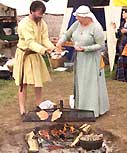
|





